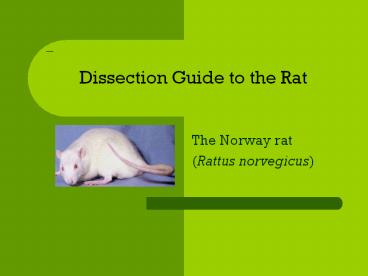Dissection Guide to the Rat - PowerPoint PPT Presentation
Title:
Dissection Guide to the Rat
Description:
Dissection Guide to the Rat The Norway rat (Rattus norvegicus) Rat Dissection Scientific Name: Rattus norvegicus Common Name: Rat Kingdom- Animalia Phylum- Chordata ... – PowerPoint PPT presentation
Number of Views:167
Avg rating:3.0/5.0
Title: Dissection Guide to the Rat
1
Dissection Guide to the Rat
- The Norway rat
- (Rattus norvegicus)
2
Rat Dissection
RATS
- Scientific Name Rattus norvegicus
- Common Name Rat
- Kingdom- Animalia
- Phylum- Chordata
- Subphylum- Vertebrata
- Class- Mammalia
- Order- Rodentia
- Family Muridae
3
(No Transcript)
4
Anatomical Terms
- Cranial-toward the head
- Caudal-toward the tail
- Dorsal-toward the backbone
- Ventral-toward the belly side
- Lateral-toward the side
- Medial-toward the middle
- Proximal closer to the the base of a structure
- Distal farther away from a structure
5
External Anatomy
- The body is long and cylindrical
- Head, neck, trunk, anterior limbs, posterior
limbs, tail.
6
External Anatomy
- Head eyes, nostrils, external ears (auriculars),
mouth, whiskers. - Neck (head , trunk).
- Trunk (thorax, abdomen).
- Ant. limbs 4 digits
- Post. limbs 5 digits
7
Male External Features
8
Female External Features
9
(No Transcript)
10
Mouth Cavity
11
Rat Dissecting Process
12
Rat Dissection
REMOVING SKIN
X
13
Rat Dissection
REMOVING SKIN
?
14
Rat Dissection
REMOVING SKIN
15
Internal Anatomy
16
Rat Dissection
Lesson One
Digestive System
17
Rat Dissection
ORAL CAVITY
18
Rat Dissection
ORAL CAVITY
19
Rat Dissection
ABDOMINAL CAVITY
20
Rat Dissection
DIGESTIVE ORGANS
21
Rat Dissection
DIGESTIVE ORGANS
22
Rat Dissection
DIGESTIVE ORGANS
23
Rat Dissection
DIGESTIVE ORGANS
24
Rat Dissection
DIGESTIVE ORGANS
25
(No Transcript)
26
?
27
(No Transcript)
28
Rat Dissection
Lesson Two
Urinogenital System
29
Rat Dissection
EXCRETORY ORGANS
30
Rat Dissection
UROGENITAL ORGANS
31
(No Transcript)
32
Rat Dissection
FEMALE REPRODUCTIVE ORGANS
- Stomach
- Kidney
- Ovary
- Oviduct
- Uterine Horn
- Rectum
- Urinary Bladder
33
?
34
(No Transcript)
35
Rat Dissection
MALE REPRODUCTIVE ORGANS
- 1. Coagulating Gland
- 2. Urinary Bladder
- 3. Vas Deferens
- 4. Epididymis
- 5. Small Intestines
- 6. Seminal Vesicle
- 7. Prostate Gland
- 8. Penis
- 9. Testis
- 10.Scrotum
36
(No Transcript)
37
(No Transcript)
38
(No Transcript)
39
?
40
?
41
Key words and Functions
- Seminal vesicle secrete thick liquid to
transport sperms. - Coagulating gland is to secrete fluids to form
the copulatory plug to help ensure fertilization. - Prostate gland secrets thin alkaline solution.
- Vas deferens transportation, ejaculation.
- Epididymis transportation, maturation, ejac.
42
- Cowpers gland secretions may lubricate, flush
out urine or form gelatinous plug. - The preputial glands produce pheromones.
- The preputial glands of female animals are
sometimes called clitoral glands. - Testis sperm production.
- Penis Copulation.
- Scrotum protection.
43
Rat Dissection
Lesson Three
Circulatory System
44
Rat Dissection
HEART
45
To LUNGS
To BODY
From BODY
To LUNGS
From LUNGS
From LUNGS
From BODY
- Blue is deoxygenated blood (from the body, going
to the lungs) - Red is oxygenated blood (from the lungs, going to
the body) - Arteries are thick walled
- Veins are thin walled
46
Rat Dissection
THORACIC CAVITY
- Trachea
- Heart
- Lung
- Diaphragm
47
Rat Dissection
RESPIRATORY ORGANS
Esophagus
Carotid
Jugular
48
Rat Dissection
HEART LUNGS
49
Arterial System
?
50
?
51
(No Transcript)
52
(No Transcript)
53
Rat Dissection
Rat Thoracic Arteries
54
Venous System
?
55
Venous System
?
56
?
57
(No Transcript)
58
(No Transcript)
59
Rat Dissection
THORACIC CAVITY
60
Rat Dissection
Rat Abdominal Cavity
61
Rat Dissection
ABDOMINAL CIRCULATION
- 1. Abdominal Aorta
- 2. Renal Artery (left)
- 3. Renal Vein (left)
- 4. Inferior Vena Cava
- 5. Hepatic PortalVein
62
Rat Dissection
Lesson Four
Endocrine System
63
(No Transcript)
64
Rat Dissection
Lesson Five
Nervous System
65
Organizational Levels of the Nervous System
Central Nervous System (CNS) Brain and Spinal
Cord Control and Integration Center
Peripheral Nervous System (PNS) Nerves from
brain and spinal cord Communication lines
between CNS and rest of body
Motor (efferent) Division Motor Neurons
Sends stimulus from CNS to muscles (and glands)
Sensory (afferent) Division Body Receptors
Sends stimulus from receptors to CNS
Autonomic Nervous System Involuntary
Control Conducts impulses from the
CNS to involuntary muscles
Somatic Nervous System Voluntary
Control Sends stimulus from CNS to
skeletal muscles
Sympathetic Division Fight or Flight
Mobilizes involuntary systems during
emergencies
Parasympathetic Division Resting and Digesting
Promotes non-emergency involuntary
functioning
66
(No Transcript)
67
Nervous System
68
(No Transcript)
69
Rat Dissection
Lesson Six
Skeletal System
70
(No Transcript)
71
(No Transcript)
72
(No Transcript)































